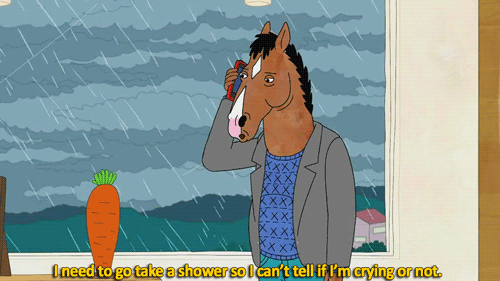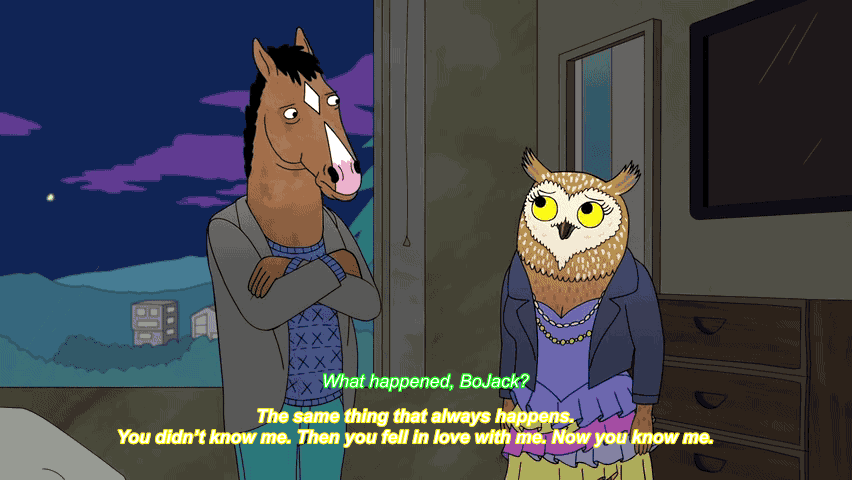Like many people my age, I've been prone to using pop-culture references as a substitute for original independent thought.
I would say I'm a little like Abed from 'Community' in that respect, but that makes it seem worse, if anything.
From watching a lot of television (and I mean
a lot), I've found myself subconsciously absorbing some tropes which produce unhelpful habits. When it comes to entertainment there's a tendency to buy into others' ideas of what's 'good' or 'bad' without thinking, and you're rarely in a more unthinking state than when using films or TV as escapism.
Mental health is one area (but by no means the only one) which mainstream shows, especially mainstream comedy, have a tendency to get wrong - even if it comes primarily from a place of ignorance rather than malice.
If you repeatedly come into contact with a two-dimensional 'crazy person' character or witness depression presented as something with a single root cause that it's possible to snap out of, it's all too easy to just accept it, especially if you're essentially using the TV as background noise while eating dinner or dicking about on your phone.
 Touchstone Television/Imgur
Touchstone Television/Imgur
Without delving too far into a conversation about whether you can ignore a show's flaws altogether and just enjoy the bits you like, it's tough to unlearn stigmatising language, especially when it's used in such a conversational manner.
It's tough to gauge whether the problems arise from writers putting together something for people like themselves, or whether the issue is writers attempting to second-guess what those unlike themselves want to see.
But while overfamiliarity can make people think something is aimed at a demographic to which they will never belong, it can also - on occasion - help people feel they're not alone.
When it comes to the subject of mental health there are some obvious examples, and the show that has helped me in this regard is
BoJack Horseman.
 Tornante/Imgur
Tornante/Imgur
On the surface,
BoJack doesn't seem like a natural vehicle to help viewers understand depression. It's a comedy about a fucking cartoon horse.
But its circumstances give it a rare freedom, allowing the excellent cast and writers to express themselves. There's no precedent for a washed-up former TV star horse who has just broken up with his girlfriend, a pink cat who is also his agent, who lives in a version of California where anthropomorphic roosters shout 'wake up' in the morning and the country's biggest television personality is a hippo. 'This scenario doesn't make sense' won't wash as a criticism.
Of course, that's by no means a magic bullet, and other programmes with similar freedoms have slipped into the same routines as the mainstream. It's not even necessarily lazy, it's just a reflex.
Still, the way
BoJack unapologetically confronts mental health matters is something to be admired, and something that, for many, will be the first available avenue for stepping back and thinking about serious themes: just because you're only half-watching while absent-mindedly playing Candy Crush doesn't mean a show can't be powerful enough to get you to pause the game and rewind 30 seconds. The good can stick with you as well as the bad.
 Tornante/Giphy
Tornante/Giphy
My understanding of my own mental health has been improved by hearing from others about their struggles - it makes a huge amount of sense when one considers the sense of loneliness often associated with depression, anxiety and other mental health disorders. It can take the form of not wanting to be around people or not feeling as though the people around you can appreciate your situation.
Familiarity can lift a weight off your shoulders for however short an amount of time, at least on a personal level. I've read friends' accounts and been able to think 'Oh, that's a symptom of depression, not just some weird f**ked up trait that only I have'. Increased mainstream coverage of mental health ought to help this even further, especially if it helps remove stigma and normalise discussions (guys, speak to your friends and ask them if they're doing ok, even just once in a while).
The benefit comes from addressing the mundanity of depression and not just its extremes. Like BoJack, I've often tricked myself into thinking the easiest way to do guarantee I do nothing wrong is to do nothing.
There have undoubtedly been situations where I've stayed in bed to avoid the prospect of coming into contact with people, or p*ssed off friends without knowing why (come to think of it, one of those two could be the consequence of the other), and sabotaged relationships out of a vague feeling of imposter syndrome.
 Tornante
Tornante
I don't want this to come across as entirely miserable, however. For all the self-reflection and - let's be honest - misery it can inspire, there are positives. And not just in terms of appealing to narcissism.
Unlike other shows which have been prone to acknowledging depression in an episode and just leaving it there,
Bojack not only introduces the themes, but recognises its reality as a condition and not just a plot progression.
Without that, its more inspirational moments wouldn't have the same impact, and any positive reinforcement would appear hollow.
It needs the bleak reality to make its hope convincing, and for me that's what makes it so compelling.
I'm not saying it will have the same impact on you, but take out a free Netflix trial and give it a go. It might help. It might not. But it's not doing nothing.
 Tornante/Imgur
Tornante/Imgur
*This article first appeared on JOE.co.uk* 


 Touchstone Television/Imgur
Touchstone Television/Imgur Tornante/Imgur
Tornante/Imgur Tornante/Giphy
Tornante/Giphy Tornante
Tornante Tornante/Imgur
Tornante/Imgur